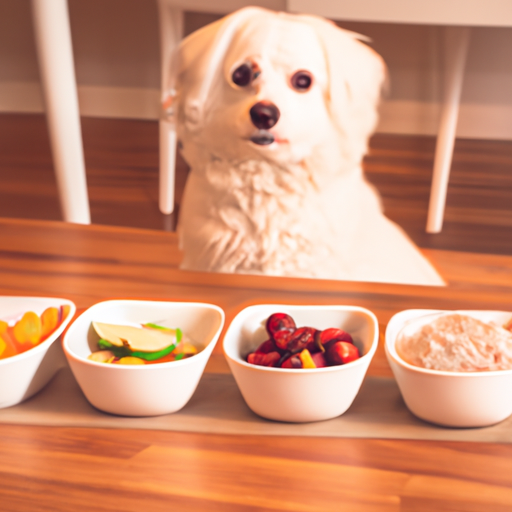Introduction
You love your dog, there’s no doubt about that. You want to provide them with the best nutrition possible, but you’re not sure what human foods are safe for them to eat. We’re here to help you navigate this tricky terrain.
What Human Foods Are Safe for Dogs?
First, let’s talk about what kinds of human food are safe for your furry friend.
- Lean meats: Chicken, turkey, fish, and lean cuts of red meat are all great sources of protein for dogs.
- Vegetables: Carrots, green beans, peas, and spinach can be a healthy part of your dog’s diet.
- Fruits: Apples, bananas, and blueberries are all safe for dogs to eat in moderation.
Remember to remove any seeds or pits from fruits, as these can be harmful to dogs.
What Human Foods Are Unsafe for Dogs?
Now that we’ve covered the good, let’s talk about the bad. There are certain human foods that can be poisonous or even deadly to dogs.
- Chocolate: This is a well-known toxin for dogs. The theobromine in chocolate can cause heart problems, muscle tremors, or seizures.
- Onions and garlic: These can damage a dog’s red blood cells, leading to anemia.
- Alcohol: Even small amounts can cause significant damage to a dog’s liver and brain.
How to Introduce New Foods to Your Dog’s Diet
When introducing new foods into your dog’s diet, it’s best to do so gradually. Here’s how:
- Start with a small amount of the new food mixed in with their regular diet.
- Monitor your dog for any signs of distress or discomfort.
- If they seem fine, gradually increase the amount of the new food over the course of a week or two.
Tips for Feeding Your Dog Human Food
Feeding your dog human food comes with its own set of unique challenges. Here are a few tips to help you navigate them:
- Portion control: Even healthy foods can cause weight gain if eaten in large quantities. Keep portions small to avoid overfeeding.
- Cooking methods: Avoid giving your dog foods that have been cooked with a lot of oil, butter, or other unhealthy fats.
- Seasonings: Many seasonings, such as salt and certain spices, can be harmful to dogs.
Human Foods as Treats for Dogs
You can also use human food as a special treat for your dog. Some favorites include:
- Peanut butter: A great source of protein and healthy fats, but be sure to choose a brand without xylitol, a sweetener that’s toxic to dogs.
- Cheese: Many dogs love cheese, but it’s best given in small amounts due to its high fat content.
- Cooked eggs: These are a great source of protein, but they should be cooked without any oil or seasonings.
| Food | Good/Bad | Reason |
|---|---|---|
| Chocolate | Bad | Contains theobromine, toxic to dogs |
| Peanut butter | Good | Source of protein and healthy fats |
| Cheese | Good | Loved by dogs, but high in fat |
| Cooked eggs | Good | Great source of protein |
Frequently Asked Questions
Q: Can dogs eat raw meat?
A: While dogs can technically eat raw meat, it’s not recommended due to the risk of bacterial contamination.
Q: What fruits can dogs not eat?
A: Dogs should not eat grapes or raisins, as these can cause kidney failure.
Q: Can dogs eat rice?
A: Yes, dogs can eat rice. It’s often used as a bland diet for dogs with upset stomachs.
Q: Can dogs eat bread?
A: Yes, dogs can eat bread, but it should be given in moderation as it can lead to weight gain.
Q: Why can’t dogs eat chocolate?
A: Chocolate contains theobromine, a substance that’s toxic to dogs and can cause a variety of health problems.
With this guide, you’re well-equipped to start incorporating safe human foods into your dog’s diet. Always remember to introduce new foods slowly and monitor your dog for any adverse reactions. Happy feeding!



